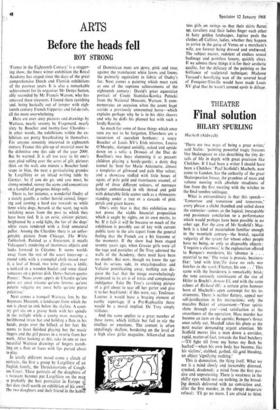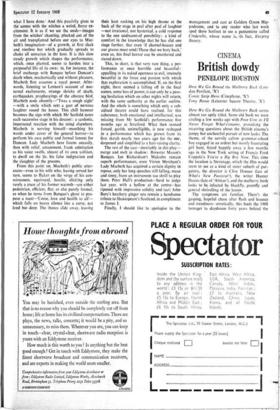TIIEATRE
Final solution
HILARY SPURLING
Macbeth (Aldwych) 'There are two ways of being a great writer,' said Stalin: 'painting powerful tragic frescoes like Shakespeare or else describing the tiny de- tails of life in depth with great precision like Chekhov. If I had been a writer I should have been a Chekhov.' Paul Scofield's Macbeth, now come to London, has the authority of the great Shakespearian fresco, the' grandeur of mass and volume moving with absolute steadiness of line from the first meeting with the witches to the final sombre soliloquy.
What is extraordinary is that this speech--- 'Tomorrow and tomorrow and tomorrow,' - every phrase a cliché thumbed and soiled down the centuries—comes as the logical, inescapable' and passionate conclusion to a performance which would perhaps have been possible in no other age. For the core of Mr Scofield's Mac- beth is a kind of materialism familiar enough in the twentieth century—the brutal, squalid vulgarity of the tyrant for whom other people have no being, or only as disposable objects: 'I require a clearness,' is the explanation offered to Banquo's murderers, his 'absence is . . . material to me.' The voice is prosaic, business- like: 'and with him/To leave no rubs nor botches in the work/Fleance, his son . . .' This scene with the inurderers is remarkably brisk; the tone curiously reminiscent of the rise of Hitler in Brecht's Arturo Ui, and with the same echoes of Richard 111: a certain grim humour born of Macbeth's open contempt for his in- struments. There is neither flattery, appeal nor self-justification in his instructions; only the macabre flicker of amusement—Tour spirits shine through you'—and satisfaction at the smoothness of the operation. Mass murder has become an item on the agenda; Banquo's throat once safely cut, Macduff takes his place as the next matter demanding urgent attention. Mr Scofield moves like a man down a corridor, rapid, matter-of-fact, towards the final butchery —T11 fight till from my• bones my flesh be hac'ked'—when his own body has become, like his victims', stabbed, gashed, slit.nd bleeding, an object 'signifying nothing.'
This is damnation, the thing itself. What we see is a mind slowly and inexorably dimmed, crushed, deadened : a mind from the first pas- sive and unprotesting. There is weakness in the shifty eyes which rest on nothing, in the brood- ,. Ing denials delivered with no conviction and, ifter the first murder, in the abrupt desperate refusal: 'I'll go no more. I am afraid to think
what I have done.' And this passivity gives to the scenes with the witches a weird, fierce ex- citement. It is as if we see the seeds—images from the witches' chanting, plucked_ out of the air and transplanted before our eyes to Mat- beth's imagination—of a growth, at first slack and rootless but which gradually spreads to choke all sensation in the host. It is this slow steady growth which shapes the performance, which, once planted, seems to harden into a purposeful life of its own: in, for instance, the' brief exchange with Banquo before Duncan's death when, mechanically and Without pleasure, Macbeth" first assumes a ' royal power. After- wards, listening to Lennox's account of noc- turnal excitements, strange shrieks of death, earthquakes, prophesyings of the obscure bird, Macbeth nods absently--Twas a rough night' —with a smile which sent a gust of nervous laughter round the house. This chill humour becomes the sign With- which Mr Scofield Sotes each successive stage in his descent: a sardonic, impersonal reaction with the mind elsewhere. Macbeth is nerving himself—mouthing his words under cover of the general horror—to perform his own public and formal lament for Duncan. Lady Macbeth here listens uneasily, then with relief, amazement, frank admiration as his voice swells, almost of its own volition, to .dwell on the lie. his false indignation and the slaughter of the grooms.
From this point on, Macbeth's public utter- ances—even to his wife who, having served her turn, seems to flicker on the verge of his con- sciousness, equivocal, , hostile, eliciting only rarely a trace of his former warmth—are either pedestrian, efficient, flat; or else purely formal, as when he turns from Banquo's ghost to pro- pose a toast—'Come, love and health to air— which falls on heavy silence like a curse, not loud but deep. The thanes slide away, leaving their host rocking on his high throne at the back of the stage in peal after peal of laughter —not irrational, not hysterical, a cold response to the one undreamt-of possibility: a kind of comfort in the knowledge that he has slid one stage further, that even 'if charnel-houses and our graves must send/Those that we bury back,' even so, this final horror can be smothered and stared down.
This, in short, is that very rare thing, a per- formance at once horrible and beautiful: appalling in its naked openness to evil, intensely beautiful in the force and passion with which that exploration is accomplished.lf, on the first night, there seemed a falling off in the final scenes, some loss of power, it can only be a pass- ing hesitation which on other nights will return, with the same authority as the earlier outline. And. the whole is something which only a sub- sidised theatre could have realised, for this coherence, both emotional and intellectual, was missing from Mr Scofield's performance five months ago at Stratford. What then seemed forced, garish, unintelligible, is now reshaped in a performance which has grown from its first sketch nearly two years ago for the sac, deepened and simplified to a hair-raising clarity.
The rest of the cast—inevitably in this play— merge and melt in shadow: Brewster Mason's Banquo, lan Richardson's Malcolm remain superb performances, even Vivien Merchant's Lady Macbeth has acquired a certain dignity in repose, only her long speeches still falling, mean and tinny, from an instrument too shrill to play them. Peter Hall's production—hard to judge last year, with a hollow at the centre—has ripened with impressive solidity and tact; John Bury's heathery ginger sets remain a handsome tribute to Shakespeare's Scotland, in compliment to James I.
Finally, I should like to apologise to the management and cast at Golders Green Hip- podrome, and to any reader who last week sped there hotfoot to see a pantomime called Cinderella, whose name is, 'fit fact, Sleeping Beauty.































 Previous page
Previous page